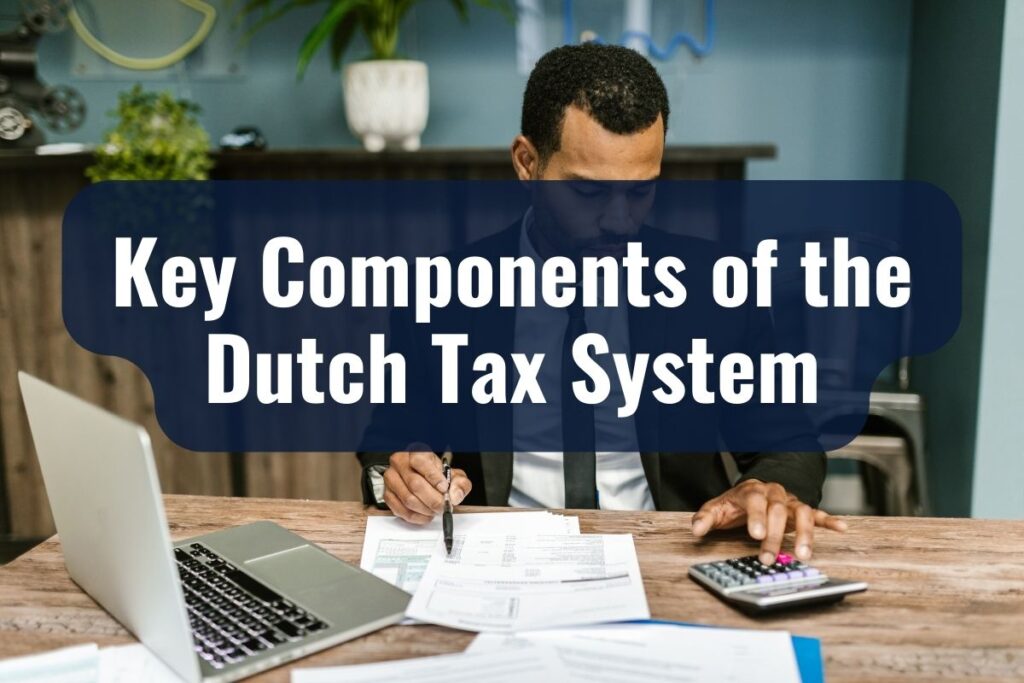Understanding the intricate waters of tax returns in a foreign country can be a formidable challenge. This guide aims to clarify tax returns in the Netherlands in a concise and clear manner. Whether you’re new to the Netherlands or just looking for a refresher, let’s demystify the process together.
Key Takeaways:
- Everyone living or earning in the Netherlands must file a tax return.
- Ensure to file your tax returns by April 1st or request an extension if needed.
- Online filing through MijnBelastingdienst is prevalent, but professional assistance can be beneficial.
- The Dutch tax system is divided into three main ‘boxes’ addressing different income types.
- Numerous deductions and allowances are available, ranging from mortgage interest to personal allowances.
- Bilateral tax treaties help prevent double taxation, ensuring you aren’t taxed twice on the same income.
- Expats should stay organized, explore the 30% ruling, and consider professional tax advice.
Who Must File a Tax Return in the Netherlands?
Understanding your obligation to file a tax return in the Netherlands is paramount. So, let’s get right to the crux of the matter: who is bound by the Dutch law to report their income and assets?
Residents
Anyone residing in the Netherlands must report their worldwide income. This includes not only Dutch citizens but also expats, international students, and job seekers who have made the Netherlands their home, even if for a brief period.
Income Earners
If you’ve worked in the Netherlands, whether it’s a full-time job, part-time gig, or freelance work, you have a tax obligation. It’s important to report this income, regardless of the amount or duration.
Asset Holders
Even if you haven’t earned an income, but have assets in the country, such as savings, property, or investments, you are required to file a tax return. The Dutch tax system takes a comprehensive view of your financial standing.
When to File?

Timeliness is a crucial component of any tax system, and the Netherlands is no exception. Adhering to deadlines ensures you avoid unnecessary fines or complications. So, let’s pinpoint exactly when you need to make your submissions:
Tax Year
In the Netherlands, the tax year aligns with the calendar year, commencing on January 1st and concluding on December 31st.
Invitation to File
By the end of February, you can expect a formal nudge from the Dutch tax office, the Belastingdienst. They’ll dispatch a blue envelope to your registered address, which contains an invitation to file your tax return. This is more than a mere formality; it’s your official cue to begin the process.
Submission Deadline
Circle April 1st on your calendar. This is the standard deadline to submit your tax return. A prompt submission ensures you’re in good standing and avoids potential late fees.
Extensions
Life can be unpredictable, and the tax office understands this. If you foresee a delay in your submission, it’s possible—and advisable—to request an extension. This isn’t a free pass, but a recognized provision that can grant you some additional time.
How to File?
Now that you’re aware of the ‘when’, let’s dive into the ‘how’. The process might seem intricate at first glance, but armed with the right knowledge, it becomes considerably more manageable. Let’s simplify the procedure for you:
Online Filing
The digital age has made many tasks, including tax filing, considerably more streamlined. The Dutch tax office, Belastingdienst, has a dedicated online portal known as MijnBelastingdienst. While this portal is primarily in Dutch, there are English resources available to guide you. If you’re not fluent in Dutch, it might be beneficial to seek assistance or use translation tools to ensure accuracy in your submission.
Paper Filing
Though online is the preferred method for many, paper forms are available for those who opt for or require them. If you choose this route, make sure your forms are filled out meticulously and sent well before the deadline to account for any postal delays.
Tax Advisors
Should you feel out of your depth or wish to ensure utmost precision, there’s no harm in seeking expert help. Numerous tax advisors and accountants in the Netherlands specialize in expat tax issues. Engaging one can offer peace of mind, as they can help pinpoint any deductions you’re eligible for and ensure all is in order.
Required Documents
When filing, make sure you have all necessary documents at hand. This includes but isn’t limited to your BSN (Burger Service Nummer), income statements, proof of any tax-deductible expenses, and details of your assets.
Key Components of the Dutch Tax System

To proficiently navigate the tax terrain of the Netherlands, it’s vital to grasp the foundational elements of its structure. The Dutch tax system isn’t just about paying what you owe; it’s segmented to account for different types of income and assets. Let’s delineate these components to enhance your understanding:
| Component | Description |
| Box 1 (Income from Work & Home) | Covers employment income, pensions, social benefits, and housing-related income. |
| Box 2 (Income from Substantial Interest) | Targets those with a significant stake in a company, covering dividends and capital gains. |
| Box 3 (Income from Savings & Investments) | Pertains to revenue from savings, stocks, and other investments. Deductions are available up to a certain threshold. |
| Tax Rates | Progressive rates apply differently to each ‘box’. |
| Deductions | Various tax deductions and credits are available within these boxes, including those for education and entrepreneurs. |
Box 1 (Income from Work and Home)
Think of this as your primary source of earnings. It encompasses income from employment, whether you’re on a permanent contract, temping, or freelancing. Additionally, pensions, certain social benefits, and even revenue tied to your main residence (like rent) fall into this category.
Box 2 (Income from Substantial Interest)
This might not apply to everyone, but it’s pivotal for those to whom it does. If you have a significant stake in a company, generally more than a 5% share, your dividends and capital gains related to this interest are taxed here.
Box 3 (Income from Savings and Investments)
The Netherlands takes a holistic view of your financial health. Any income stemming from savings, stocks, bonds, or other investments, even if they’re not Dutch-based, goes into this box. Do note that certain thresholds and exemptions apply, which can influence the amount you’re taxed.
Tax Rates
Each ‘box’ has its own set of progressive tax rates. While these rates can be subject to change based on annual budgets and policies, staying updated ensures you know what percentage of your income will be levied.
Deductions
Integrated within these boxes are various tax deductions and credits. These can range from education-related deductions to specific allowances for entrepreneurs. Understanding which ones you’re eligible for can significantly mitigate your tax liability.
Deductions and Allowances
No tax guide would be complete without addressing the critical aspect of deductions and allowances. These provisions, instituted to offer financial relief and promote certain expenditures, can considerably lighten your tax burden. But it’s vital to know which ones apply to you, so let’s delve into the primary deductions and allowances pertinent to expats and international job seekers:
Mortgage Interest Deduction
If you’ve bought a home in the Netherlands, there’s a good chance you’ve taken out a mortgage. The interest you pay on this mortgage is, under specific conditions, deductible from your taxable income. This provision encourages homeownership and can amount to a significant yearly deduction.
Personal Allowances
These can include costs for specific healthcare needs, study expenses for improving your career, and alimony payments. If they meet the established criteria, these expenditures can be subtracted from your taxable income.
Entrepreneur Deductions
If you’re an entrepreneur or run a small business, the Dutch tax system offers a bouquet of deductions. These can encompass a general deduction for entrepreneurs, investment deductions for business assets, and even deductions for research and development work.
Tax-Free Allowance in Box 3
Remember the savings and investments box? There’s a tax-free allowance here, meaning that up to a certain amount, your savings and investments aren’t subject to tax. Anything above this threshold is taxed, but it’s essential to know where that line is drawn each year.
Gift and Inheritance Tax
While not a deduction per se, it’s worth noting that the Netherlands has regulations around gifts and inheritances. Certain amounts can be gifted tax-free, and inheritances have specific thresholds and exemptions.
Double Taxation Relief
For expats, double taxation – paying tax in both your home country and the Netherlands – is a genuine concern. Thankfully, the Netherlands has treaties with many countries to prevent this. You might be eligible for relief or a credit, ensuring you aren’t taxed twice on the same income.
Double Taxation Relief

A recurring concern for many expats and international job seekers is the prospect of being taxed twice: once in the Netherlands and then again in their home country. This can understandably feel like an undue financial burden. The good news is that the Dutch tax system recognizes this challenge and has provisions to mitigate it. Let’s explore the realm of double taxation relief in the Netherlands:
Bilateral Tax Treaties
The Netherlands has entered into bilateral tax treaties with a plethora of countries around the globe. The primary objective of these treaties is to offer clarity on which country has the taxing rights on specific types of income. In essence, they ensure that the same income isn’t taxed in two jurisdictions.
Methods of Relief
Typically, the Netherlands adopts two main methods to eliminate double taxation. One is the Exemption Method, where certain foreign-sourced income is exempt from Dutch tax. The second is the Credit Method, where the Netherlands levies tax on the foreign income but provides a credit for the tax paid in the other country. The actual method applied often depends on the specific treaty in place with the other nation.
Applying for Relief
It’s not always automatic. While certain forms of income might qualify for double taxation relief based on the applicable tax treaty, you may need to actively claim this relief when filing your tax return. Make sure you’re familiar with the necessary forms and documentation required to substantiate your claim.
Foreign Tax Identification
When claiming double taxation relief, you’ll often need to provide your foreign tax identification number. This aids the Dutch tax authorities in verifying your tax position in the other country.
Keep Abreast of Changes
Tax treaties can, at times, be renegotiated or updated. It’s imperative to stay informed about any changes in the treaty that your home country has with the Netherlands. Such changes could influence your eligibility for double taxation relief or the manner in which it’s provided.
Tips for Expats
Embarking on a new life in the Netherlands comes with its fair share of excitement and challenges. Taxation, while crucial, should not be a stumbling block in your Dutch adventure. With this in mind, let’s equip you with some actionable tips to make your tax journey as an expat in the Netherlands smoother:
- Early Familiarization: Take the time to familiarize yourself with the Dutch tax system as soon as you arrive. A rudimentary understanding will not only demystify the process but can also help you identify potential tax benefits early on.
- Secure Your BSN: The Burger Service Nummer (BSN) is your key to interacting with many Dutch institutions, including the tax office. Ensure you obtain this unique identification number promptly upon arrival.
- Stay Organized: Keep a dedicated folder, digital or physical, for all tax-related documents, receipts, and correspondence. This organized approach will prove invaluable when it’s time to file.
- Explore the 30% Ruling: A significant tax advantage for some expats is the 30% tax ruling, a tax exemption scheme designed for skilled labor moving to the Netherlands. If you meet the criteria, it can result in significant tax savings.
- Stay Updated: Tax laws and provisions can change. Make it a habit to stay informed about any alterations to the tax system, especially those that might affect expats.
- Seek Expertise: While it’s entirely possible to manage your taxes independently, don’t hesitate to engage a tax consultant if you feel unsure. Professionals who specialize in expat taxation can provide insights and assistance tailored to your unique situation.
- Open Communication: If you’re uncertain about something related to your taxes, reach out to the Belastingdienst (Dutch Tax Office). They can provide clarifications and are there to assist taxpayers in understanding their obligations.
- Consider Your Global Footprint: As an expat, you might have assets or income in other countries. Always consider the broader picture when addressing your Dutch taxes to ensure full compliance both locally and abroad.
Related: New to the Netherlands: Everything You Need to Know (2024)



